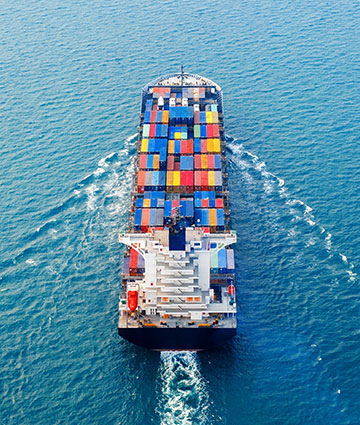Marine Industry/ Shipping Companies

Seafarers & Work stress:

The work of seafarers demands them to be away from family and dear ones for long periods of time. Poor connectivity while in the sea can prevent them from communicating with their families. Conflicts between the crew members, high work stress and no way out from their work environment and threats of pirates in the sea can lead to feelings of loneliness and isolation. There also exists the stigma of people seeking out help as it might be a sign of weakness. Seafarers engage in a dangerous physical and psychological work environment.

Risk Factors & Analysis:

Risk factors against health conditions include extreme heat, cold, multiculturalism and multinationalism. For a seafarer, impact on physical health coupled with psychological issues such as job dissatisfaction levels may lead to mental health problems like depression, stress and, at its worst, suicidal ideation. Pressure from contractors, time and job stress in seafaring are negatively related with job satisfaction levels and positively associated with intention to leave. Seafaring more than 3 months are more likely to produce psycho-emotional strain. Port stay introduces more stress as it physically demands loading and unloading operations, working as a watch keeper, repairing an engine, refuelling etc.
Counselling & Benefits:

Counsellors help seafarers in overcoming mental stress caused due to problems like poor team relationships on board due to hierarchy, cultural differences, burnout, harassment, accidents and so on. Counselling helps them cope with work stress, maintain good relationship with the members on the crew and also help them learn how to support each other when loneliness and frustration strikes in the sea.
Psychometric Assessment:

When planning a recruitment campaign for a leadership role, psychometric testing for desirable personality can be helpful in gaining a deep understanding of potential candidates. The key is knowing how to select the right traits for your company, team, or role. There are a number of profiling methods that can be employed in this process.
Life/Coping Skills for Students:

Students pursuing marine engineering need to be equipped with life skills that can help them sustain themselves through life and that can make them effectively manage challenges of everyday shipboard life as a preparation for their career life ahead. These skills, referred to as coping skills, are essential as they prepare to take their place in the industry as responsible officers. The challenge is how to mold and retain competent seafarers who are willing to render longer sea service while remaining positive about reaching the peak of their career. The industry requires marine officers who not only are competent but also have soft skills that enable them to cope and survive. They need to develop interpersonal and social skills, leadership and teamwork, self-management, problem-solving and health maintenance which will create a better workforce.

Leadership Training:

The core focus of leadership training offered to seafarers is on building and improving leadership and management capabilities, identifying and growing talent for future leadership positions, and developing high performing teams. This training provides a range of different leadership approaches so that participants could consider the method that suits them the best relative to their personal business situations.
It helps seafarers in gaining self-awareness – recognizing the benefits & risks of personality styles, identifying leadership strengths & challenges, understanding how to reduce risk, and learning how to motivate & get the best from people.
This training discusses positive behaviors and traits of effective leaders, practical decision-making processes and the essence of outstanding communication in maritime environments.
Emotional Intelligence:

Emotional Intelligence entails the ability of an individual to monitor his or her emotions and those of the others, to use this information to guide his or her thinking and emotions. The emotional, personal, and social components of intelligent behavior skills will influence one’s ability to succeed in wit the environmental demands and pressure. This capability appears to be particularly important in maritime management. The relationship between the emotional intelligence trait of the seafarers and their job performances during a maritime transportation process is analyzed.
Shaping Traits:

Emotional Intelligence training emphasizes on building traits such as open to change, self-awareness, becoming more empathetic and unbiased. The job of a seafarer requires them to be highly adaptable to changes, even if they’re not open to change in the starting, they have to try to be more adaptable as the job requires it. They also have to know what they are good at, and they still have to learn. Being able to be more empathetic towards their fellow seafarers on board will help them to understand what they are going through.
Role of Element H in this industry

- Psychometric assessments for leadership skills, personality, general intelligence, counselling, psychological aspects of safety, teamwork, human element, soft skills, training services for shipping companies.
- Life Skill Training Program for Maritime Training Centres, which includes psychological assessment and counselling for students pursuing Marine Engineering to enhance their Life Skills.
- Emotional Intelligence training, Leadership Effective training.
- Psychometric assessments and psychotherapy for emotional dysregulation, career assessments and guidance, approaches to tackle psychological distress during the pandemic.
Get in Touch with ElementH

Please Fill out the form, We will contact you at the earliest.
